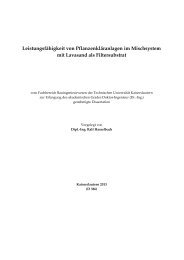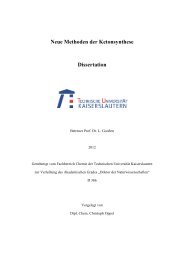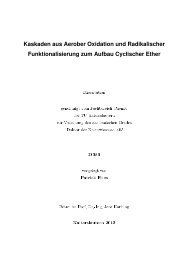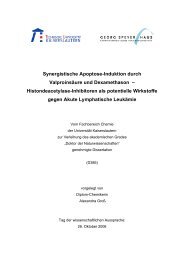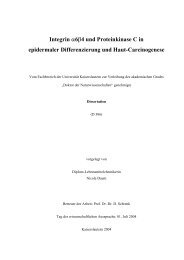ecology of phasmids - KLUEDO - Universität Kaiserslautern
ecology of phasmids - KLUEDO - Universität Kaiserslautern
ecology of phasmids - KLUEDO - Universität Kaiserslautern
Create successful ePaper yourself
Turn your PDF publications into a flip-book with our unique Google optimized e-Paper software.
Abstract 93<br />
7 Abstract<br />
Herbivory is discussed as a key agent in maintaining dynamics and stability <strong>of</strong> tropical forested<br />
ecosystems. Accordingly increasing attention has been paid to the factors that structure tropical<br />
herbivore communities.<br />
The aim <strong>of</strong> this study was (1) to describe diversity, density, distribution and host range <strong>of</strong> the phasmid<br />
community (Phasmatodea) <strong>of</strong> a moist neotropical forest in Panamá, and (2) to experimentally assess<br />
bottom-up and top-down factors that may regulate populations <strong>of</strong> the phasmid Metriophasma diocles.<br />
The phasmid community <strong>of</strong> Barro Colorado Island was poor in species and low in density. Phasmids<br />
mainly occurred along forest edges and restricted host ranges <strong>of</strong> phasmid species reflected the<br />
successional status <strong>of</strong> their host plants. Only M. diocles that fed on early and late successional plants<br />
occurred regularly in the forest understory.<br />
A long generation time with a comparably low fecundity converted into a low biotic potential <strong>of</strong><br />
M. diocles. However, modeled potential population density increased exponentially and exceeded the<br />
realized densities <strong>of</strong> this species already after one generation indicating that control factors<br />
continuously affect M. diocles natural populations. Egg hatching failure decreased potential<br />
population growth by 10 % but was <strong>of</strong> no marked effect at larger temporal scale.<br />
Interspecific differences in defensive physical and chemical leaf traits <strong>of</strong> M. diocles host plants,<br />
amongst them leaf toughness the supposedly most effective anti-herbivore defense, seemed not to<br />
affect adult female preference and nymph performance. Alternatively to these defenses, I suggest that<br />
the pattern <strong>of</strong> differential preference and performance may be based on interspecific differences in<br />
qualitative toxic compounds or in nutritive quality <strong>of</strong> leaves. The significant rejection <strong>of</strong> leaf tissue<br />
with a low artificial increase <strong>of</strong> natural phenol contents by nymphs indicated a qualitative defensive<br />
pathway in Piper evolution. In M. diocles, oviposition may not be linked to nymph performance,<br />
because the evolutionary prediction <strong>of</strong> a relation between female adult preference and nymph<br />
performance was missing. Consequently, the recruitment <strong>of</strong> nymphs into the reproductive adult phase<br />
may be crucially affected by differential performance <strong>of</strong> nymphs.<br />
Neonate M. diocles nymphs suffered strong predation pressure when exposed to natural levels <strong>of</strong><br />
predation. Concluding from significantly increased predation-related mortality at night, I argue that<br />
arthropods may be the main predators <strong>of</strong> this nocturnal herbivore. Migratory behavior <strong>of</strong> nymphs<br />
seemed not to reflect predation avoidance. Instead, I provided first evidence that host plant quality<br />
may trigger <strong>of</strong>f-plant migration.<br />
In conclusion, I suggest that predation pressure with its direct effects on nymph survival may be a<br />
stronger factor regulating M. diocles populations, compared to direct and indirect effects <strong>of</strong> host plant<br />
quality, particularly because slow growth and <strong>of</strong>f-host migration both may feed back into an increase<br />
<strong>of</strong> predation related mortality.



